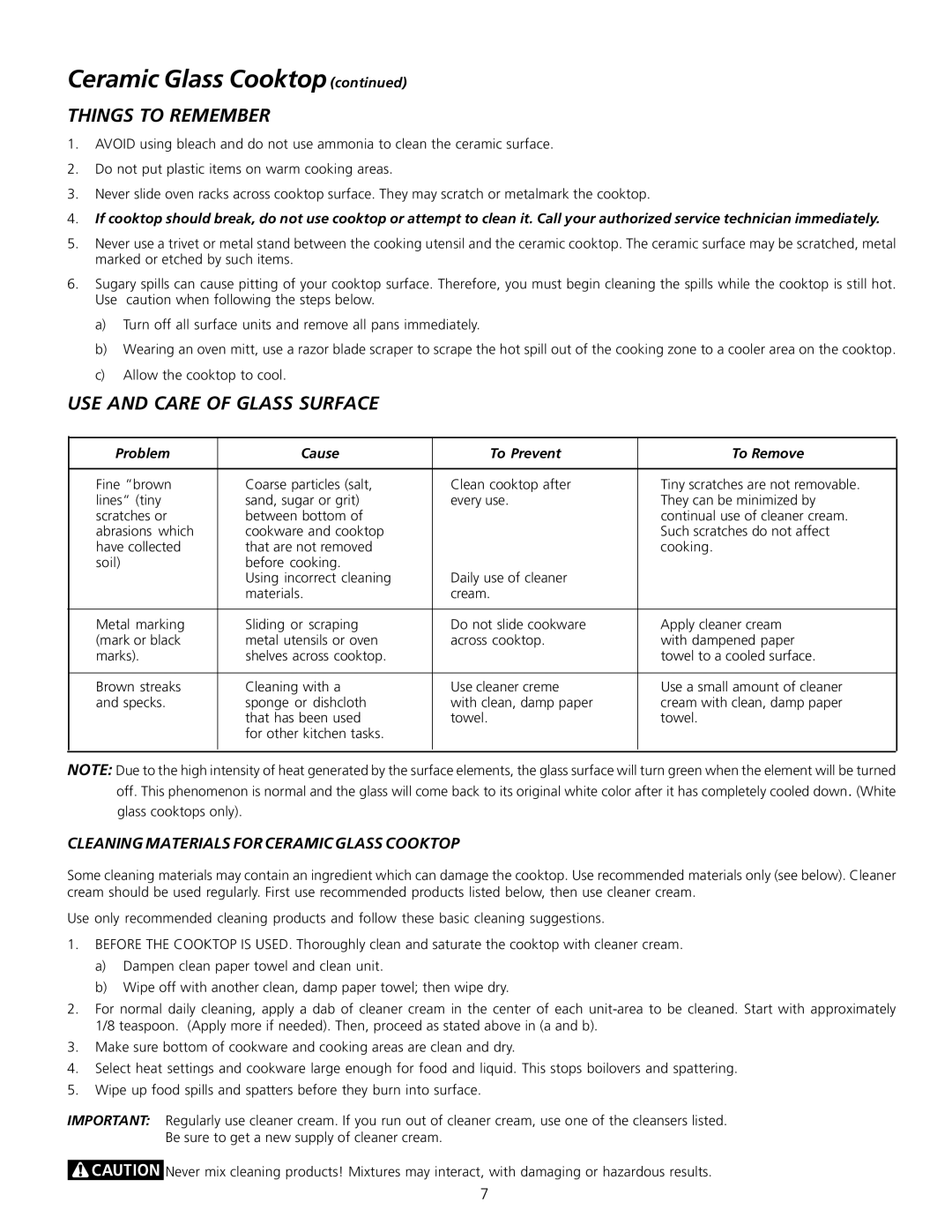Ceramic Glass Cooktop (continued)
THINGS TO REMEMBER
1.AVOID using bleach and do not use ammonia to clean the ceramic surface.
2.Do not put plastic items on warm cooking areas.
3.Never slide oven racks across cooktop surface. They may scratch or metalmark the cooktop.
4.If cooktop should break, do not use cooktop or attempt to clean it. Call your authorized service technician immediately.
5.Never use a trivet or metal stand between the cooking utensil and the ceramic cooktop. The ceramic surface may be scratched, metal marked or etched by such items.
6.Sugary spills can cause pitting of your cooktop surface. Therefore, you must begin cleaning the spills while the cooktop is still hot. Use caution when following the steps below.
a)Turn off all surface units and remove all pans immediately.
b)Wearing an oven mitt, use a razor blade scraper to scrape the hot spill out of the cooking zone to a cooler area on the cooktop.
c)Allow the cooktop to cool.
USE AND CARE OF GLASS SURFACE
Problem | Cause | To Prevent | To Remove |
|
|
|
|
Fine ”brown | Coarse particles (salt, | Clean cooktop after | Tiny scratches are not removable. |
lines“ (tiny | sand, sugar or grit) | every use. | They can be minimized by |
scratches or | between bottom of |
| continual use of cleaner cream. |
abrasions which | cookware and cooktop |
| Such scratches do not affect |
have collected | that are not removed |
| cooking. |
soil) | before cooking. |
|
|
| Using incorrect cleaning | Daily use of cleaner |
|
| materials. | cream. |
|
|
|
|
|
Metal marking | Sliding or scraping | Do not slide cookware | Apply cleaner cream |
(mark or black | metal utensils or oven | across cooktop. | with dampened paper |
marks). | shelves across cooktop. |
| towel to a cooled surface. |
|
|
|
|
Brown streaks | Cleaning with a | Use cleaner creme | Use a small amount of cleaner |
and specks. | sponge or dishcloth | with clean, damp paper | cream with clean, damp paper |
| that has been used | towel. | towel. |
| for other kitchen tasks. |
|
|
|
|
|
|
NOTE: Due to the high intensity of heat generated by the surface elements, the glass surface will turn green when the element will be turned off. This phenomenon is normal and the glass will come back to its original white color after it has completely cooled down. (White glass cooktops only).
CLEANING MATERIALS FOR CERAMIC GLASS COOKTOP
Some cleaning materials may contain an ingredient which can damage the cooktop. Use recommended materials only (see below). Cleaner cream should be used regularly. First use recommended products listed below, then use cleaner cream.
Use only recommended cleaning products and follow these basic cleaning suggestions.
1.BEFORE THE COOKTOP IS USED. Thoroughly clean and saturate the cooktop with cleaner cream.
a)Dampen clean paper towel and clean unit.
b)Wipe off with another clean, damp paper towel; then wipe dry.
2.For normal daily cleaning, apply a dab of cleaner cream in the center of each
3.Make sure bottom of cookware and cooking areas are clean and dry.
4.Select heat settings and cookware large enough for food and liquid. This stops boilovers and spattering.
5.Wipe up food spills and spatters before they burn into surface.
IMPORTANT: Regularly use cleaner cream. If you run out of cleaner cream, use one of the cleansers listed. Be sure to get a new supply of cleaner cream.
![]() Never mix cleaning products! Mixtures may interact, with damaging or hazardous results.
Never mix cleaning products! Mixtures may interact, with damaging or hazardous results.
7
